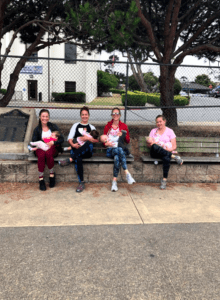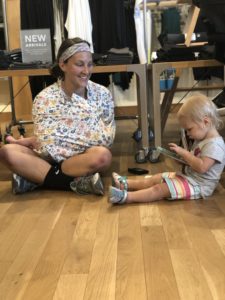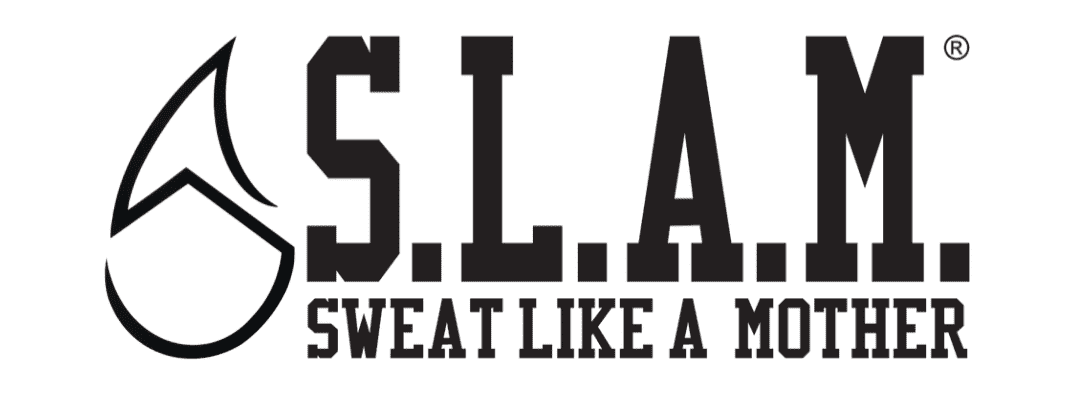Last week was World Breastfeeding Week! Some of our locations shared pictures of THEIR sweet Mama’s nursing before, during, or after class. I’ve sprinkled their BADA** breastfeeding pictures throughout the article. Enjoy!
Let me start by saying that no matter how you feed your children, YOU ARE KILLING THIS MOM THING! We all have to make decisions based on what works for us, our kids, our families, and our lives. This is a very personal decision. As long as your baby is happy and healthy AND you are happy and healthy- DO YOU, MAMA.
*You may find that some of this article interests/applies to you, and some may not. I have decided to be detailed with this article, so don’t feel bad about skipping around. I talk about tongue and lip ties, the importance of lactation consultants, some breastfeeding myths for those early days, D-MER (READ THIS PART!), and extended nursing. Read what applies to you and ignore the rest!

Picture by Megan Freeman Photography of Anchorage, AK
My Journey with Breastfeeding
I love breastfeeding. I mean, did you know that your body uses your child’s saliva while breastfeeding to figure out exactly what antibodies they need at that time to create milk specifically for their needs at the moment?! Our bodies are so cool! Because I think breastfeeding is so awesome, I want to talk to you about my personal journey with breastfeeding from exclusively pumping, to exclusively breastfeeding with D-MER, to extended breastfeeding. I am far from a professional on the topic, but I’ve breastfed for 2.5 years every single day and night nonstop after overcoming many obstacles to get here, so my hope is just that I teach someone something new or encourage someone who needed it. My toddler nurses before nap and bedtime, this situation still works well for our family. I appreciate that not everyone wants to nurse this long, while others may want to nurse much longer. DO YOU, MAMA.
I am what I call an “over researcher” and what my husband calls a “know it all”. Before my son was born, I read every single thing I could about breastfeeding in preparation for this new journey. I was still underprepared. I knew I would need nipple cream, but that doesn’t prepare you for the chapped nipples that make you want to cry every time your child latches. I knew your milk takes a little to come in, I didn’t know it was possible for it to take too long to come in (rare, but happened to me). I knew your boobs get bigger, but I didn’t know that if your child sleeps a tiny bit longer than normal that your boobs suddenly become rock hard water balloons with a leak. I knew your boobs would be forever changed, I wasn’t prepared for how different they would truly be once you’ve been breastfeeding for a while and they no longer feel full and plump (RIP my perky pre-baby boobs).
Here’s how being a know it all DID help me, though. I knew that when my son was born I wanted the doctor to check for a tongue tie while still in the hospital, and I knew that I wanted to see a lactation consultant before I left, too. If you plan to breastfeed at all for any length of time, you should plan to do the same.
*I will also be doing this if and when we ever have a second baby!

Tongue Ties and Lip Ties are extra tissue either under the tongue or under the upper lip that cause restricted movements within the mouth. They are both common, but most of the time they don’t cause issues with breastfeeding. One study even found that 199 of 200 babies examined had some form of ties, but only 7/200 of those babies had issues with breastfeeding because of them. Ties can also lead to problems with speech and tooth health, so regardless if you’re breastfeeding or not, I encourage you to have your baby checked for this. The initial Pediatrician brushed me off when I asked him to check my sons mouth, so I was so thrilled that the Pediatrician who I had intentionally chosen for my son came in and immediately checked upon request. Sure enough, he had a tongue tie. We had my sons tie cut by a surgeon 5 days after he was born. It was less than a 5 minute procedure in which I am almost positive that I cried more than my newborn. As I will elaborate more on soon, this procedure saved my breastfeeding journey.

A Lactation Consultant (please look up “Angel” for further information) is a professionally trained breastfeeding specialist. They work with women to teach mothers how to feed their babies and work with them through any difficulties. I met my Lactation Consultant in the hospital before I left where she literally taught me how to breastfeed. I truly had zero clue what I was doing. She taught me different positions to hold my baby in, taught me what to look out for, and tricks to work around the tongue tie. During the 5 days before my sons tongue tie was clipped, my son learned to latch to my breast incorrectly, and my LC retrained my son to latch correctly.

For the first two weeks of my sons life, I exclusively pumped (exclusive pumping Moms deserve a medal, I don’t know how you ladies do it!) and bottle fed my son. My LC facilitated the transition to breastfeeding as the latch between breast and bottle may be different, the flow between the two are very different, and while you may have to minitor how much a baby eats with bottle, you simply feed on demand with the breast. She also helped ease my worried mind by providing me with bi-weekly and then weekly weighted feeds -where you first weigh the baby on their scale, feed the baby while there, then weigh them again to see exactly how much milk they’re drinking-, gave me someone to talk to every week to check in with, helped me through the horrible case of thrush my son got, and figured out that my sons excessive vomiting wasn’t normal but rather was caused by severe dairy intolerances. I cannot stress enough how much this woman did for me and how important she was in getting me to where I am with nursing today. Every single woman needs to take advantage of this service that hospitals provide!

Another struggle that we had in the beginning was my milk taking longer than normal to come in. Generally speaking, your milk should come in between 2 and 5 days and that’s PERFECT! Before then your body is producing colostrum, which is all your tiny, new baby needs. Their tummies are so small that they fill up very easily, and colostrum is the best of the best in terms of nutrition for a newborn. Unfortunately for me, my body wasn’t producing near enough of colostrum even, while my milk took much longer to arrive at all. Despite my son nursing (with his tongue tie so imagine ALL THE PAIN) 24/7 with zero breaks ever, my son would not stop screaming. He was miserable. I sensed something was wrong so I rushed him back to the hospital and sure enough, he was jaundice, dehydrated, and starving by 3 days old. I, “Miss Over Researcher” herself, had accidentally starved my newborn baby. That day, my doctor insisted I supplement formula, to which I sobbed over because my perfect nursing journey was falling apart before my eyes. Still, I did it and almost immediately my angry baby became happy, content, and tired. It wasn’t for three more days that my milk would come in, which is when I started exclusively pumping (and stopped using formula because I produced SO MUCH MILK), and worked with my LC to eventually transition back to breast.

A couple days after my milk came in, my boobs felt different again. I was terrified that I was drying up already and that my baby wasn’t getting enough milk. My LC quickly proved that to be wrong with the weighted feed, and I discovered a few things that I think EVERY new mom NEEDS to know:
- It’s normal for your baby to want to nurse 24/7, that doesn’t mean that they’re starving or not getting enough milk. They may be cluster feeding -when your baby wants to do many short feeds close together or never wants to get off the breast, encouraging your milk to come in and regulate the amount your produce-, feeding for comfort, be going through a growth spurt, or so many other reasons. Feed on demand and you’ll be golden!
- You can’t overfeed a breastfed baby with the breast. Bottle feeding, with either breastmilk or formula, doesn’t necessarily follow this rule. But a baby, unless they have some underlying medical issue, will not overeat on the breast because biology is incredible.
- Your breasts may feel flat/deflated, that doesn’t mean that they’re “empty”. It’s normal as long as your babe is still producing enough wet and poopy diapers.
- You don’t need to “top off” a breastfed baby with formula or breastmilk in a bottle. Don’t assume that because they’re crying after they nurse or never want to stop nursing that they need something extra (see again: cluster feeding). This may lead to them filling up on formula and therefore nursing less, causing you to produce less milk, and creating a cycle that will overall hurt your breastfeeding relationship. This is called the “Top Off Effect”. Go off of diapers again and if you’re still worried, go in for a weighted feed.
- If your baby seems overly unhappy, consider trying an elimination diet to get rid of dairy, soy, and gluten. Intolerances in babies are not uncommon. Talk to your LC or Pediatrician if you are worried about this.

I went through a lot to get to have a successful breastfeeding journey. Most of it occurred within those first few weeks (minus the year and a half I was dairy free). D-MER, however, lasted much much longer and I didn’t know what it was until several months in. D-MER, or dysphoric milk ejection reflex, is a physiological reflex rather than a psychological response to breastfeeding and is therefore unrelated to maternal mood disorders like PPD or PPA. It is characterized by a “sense of depression and this feeling can range from mild homesickness or wistfulness to more intense feelings of hopelessness and self-loathing. Similarly, anxiety may range from restlessness to more intense panic and dread. Anger, the least likely of the three, may range from tension and agitation to more intense feelings of hostility and aggression” (Alia Macrina Heise). For me, it felt like a wave of anxiety (well, MORE anxiety as I also had PPA) that led to an immediate loss of appetite as it felt as though my stomach as doing flips. I feel thankful that this was the extent of my D-MER as I have close friends that experienced waves of extreme depression during let-down, and one who felt a rush of rage every time. The biggest “treatment” for D-MER is education, which is also why all of my friends with more severe reactions ended their journeys early. Many people haven’t even heard of D-MER. If you know what you’re dealing with, you may then know to journal your difficulties to help you track your triggers or even find foods and other natural remedies to help balance your oxytocin and dopamine levels (the hormones that are rising and falling, causing these feelings). Many women don’t understand what’s happening, only that they’re miserable whenever they nurse their baby. It’s difficult when you’ve been told non-stop how amazing and special this breastfeeding relationship is, how it helps strengthen the bond between a mother and child, just for it to cause you rolling waves of depression, anxiety, or anger. It’s even more frustrating when you don’t even understand why. Thankfully I was able to figure out what was happening to me, and I used that reassurance to carry me through until the symptoms subsided. I really just lucked out that my Google search led me to the right places, but not everyone is as lucky as I am. I believe with proper warning of the possibilites and symptoms of D-MER, more mothers could be adequately prepared and their breastfeeding relationships may last longer.

Nowadays my breastfeeding journey is much more relaxed. We nurse before nap and bedtime, and sometimes during the night if he wakes up. The problem, which is only a problem for other people not for me, is that my son is 2.5. That makes us, according to most people, an extended breastfeeding family. I fully support a mother’s right to not breastfeed, stop at 6 months, 1 year, or whenever they decide is right for their situation. Unfortunately in America, it’s seen as a bit odd to continue nursing past 1 year old. Why is that though? The benefits of breastfeeding don’t magically stop at a year. Our breastmilk continues to provide nourishment, defense against disease, and comfort. According to the World Health Organization, breastmilk should be a part of a child’s diet until 2 OR BEYOND! Additionally, the natural and biological weaning age of a child is between 2.5 and 6-7…!!! That’s insane. While I don’t forsee myself going anywhere near that long, it’s crazy to learn about what the biological norm is.
With all of the above in mind, why is it seen as “weird” and even “gross” to some adults that children are breastfed into their toddler years? Children don’t have sexual urges, so to sexualize the natural act of breastfeeding a child is beyond wrong. That shouldn’t ever be used as an excuse. Is it simply because we as a society aren’t used to seeing it, and therefore it makes some uncomfortable? That’s my best guess. In which case, I think the #NormalizeBreastfeeding movement is even more important because a mother shouldn’t feel ashamed with any decision they’ve made within their very personal breastfeeding journey.
I write these 2000+ words (I am incapable of being concise, I apologize) with two purposes:
1. To Educate
2. To Encourage
I hope that I was able to do at least one of those things for you here. I also want to make sure that it’s clear that I think whatever method you’ve chosen for you -breastfed, exclusive pumping, formula fed, covered nursing, uncovered nursing, donor milk, goat milk formula… WHATEVER- is perfect for you!! If you’re considering breastfeeding or currently breastfeeding for the first or fifth time, however, I hope some part of this helped or resonated with you. All of our journey’s look different and I support you no matter what yours looks like. DO YOU, MAMA.

Recent Comments